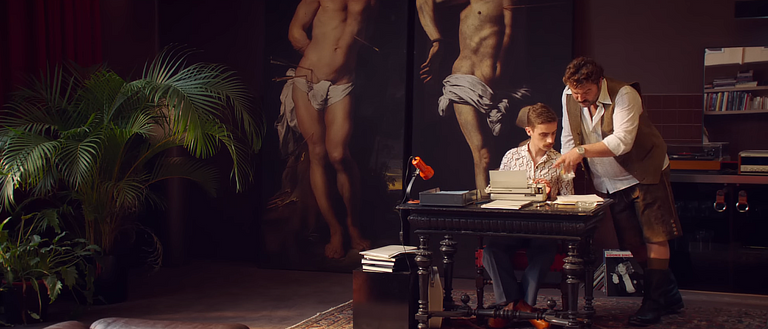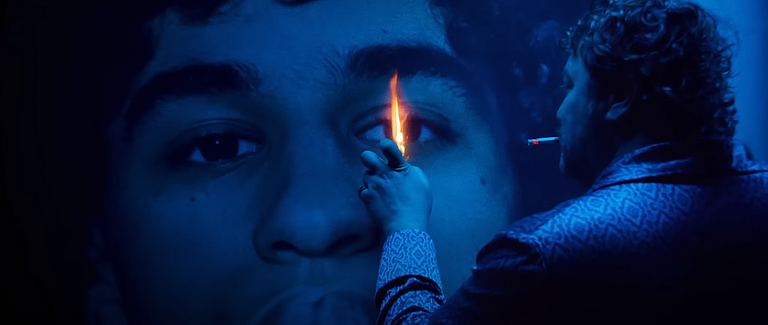Peter Von Kant: one of Francois Ozon's most successful films - review
We are in 1970s Cologne, in a red-walled downtown flat, furnished with Renaissance tapestries, film posters and eccentric furniture, where depressing French songs about betrayed loves and ungrateful lovers resound. The portly, moustachioed Peter Von Kant (Denis Menochet), considered a genuine camera genius, basks there for the vast majority of the time, drinking gin and tonics, smoking and moping. He pines for the inauspicious fate that drove his last great but 'vastly overrated' love away from him, insulting every human being who comes closer than ten feet to him. Such as his impeccable waiter/assistant/toyman Karl (Stefan Crepon), a moustachioed young man who wears jumpers with geometric embroidery and copes, with resolution and obsequious silence, with his every rude, peremptory and repeated request.

Around midday, the great artist gets up from his big pink bed and desperately tries to return to success after a period of 'fatigue', chasing after his friends and actresses like Romy Shneider with letters and communiqués, reworking old scripts or rewatching his old hits on film in the room that serves as his studio and cinema. Usually only his mother Rosemarie (Hanna Schygulla) calls him on the phone. Then suddenly, the actress who is closest and dearest to him, Sidonie (Isabelle Adjani), although of course she too is 'ungrateful and overrated', shows up at Peter's house with a young man in his 20s, Amir (Khalil Ben Gharbia).
He is handsome and curly-haired, with Middle-Eastern charm and dark eyes. Handsome and mysterious, with a tragic past and a dreamy smile, zero experience as an actor and a great desire to travel and love: the perfect person to fall in love with and at the same time 'reshape life through art', holding on to so much pain, purity and the search for a safe haven. Things are so enthralling and heart-warming that Peter shows off many languid eyes and his best leather jackets for him. Before long, gigantic photos of the boy and his 'artistic reinterpretations' appear on all the walls in the flat, such as a painting of the famous Martyrdom of St Sebastian, with Amir appearing saintly, naked and wounded in the side. It is for Peter definitely love, with Karl witnessing this "happy phase" of his principal with a hint of regret, being obliged to attend even the effusions of the two lovers in order to lavish them with rapid-fire glasses of champagne. In a short time Amir becomes very famous as an actor and Peter's career takes off again, but the couple soon fails. The boy bosses him around, he deserts acting lessons, is always "busy and elsewhere" and maybe even has someone else. Wounded and increasingly angry with the rest of the world, Peter is about to celebrate his birthday.
This is one of Francois Ozon's most successful and entertaining films, the second work the French filmmaker has adapted from a work by the great Rainer Werner Fassbinder. An author who was a writer, playwright and as a director one of the greatest exponents of the "new German cinema" of the 1970s and 1980s. Peter Von Kant is loosely based on The Bitter Tears of Petra von Kant (Die bitteren Tränen der Petra von Kant) and puts a funny, amusing and melancholic Denis Menochet at centre stage, who in all respects reminds us a lot of Fassbinder himself: in terms of stature, posture, clothing and volcanic and "rough" nature.
A man who is as brilliant and sensitive as he is tragically incapable of loving anyone, without being able to idealise him and finally "possess him like an object". A man who feels lonely even when surrounded by his closest affections, because he is constantly overwhelmed by passions as fleeting as they are unbridled, towards partners who are too young, beautiful and impossible to "contain and tame" as he would like.

Artistic genius and everyday unruliness often mingle and overlap in the film, in a "tragicomic one-man show", with Peter as the absolute leading actor and "sole ruler of his flat", constantly trying to steal the spotlight from the other characters on the scene, in an eccentric and almost spiteful manner.
The décor and style of the flat where the story is set, which a young viewer could very well "mistake" for the setting of a Wes Anderson film, is in fact for Peter his entire inner world, where all the others are guests, servants or intruders. All nicely labelled and functional to his expectations.
His handyman assistant Karl, played by the excellent Stefan Crepon, is a character who, due to the complicated circumstances in which he finds himself working, prefers to be "mute". He moves between the rooms of the apartment-scene with the grace and composure of a mime, his gaze always alert and his style impeccable, letting his actions (whether more precise or hasty) reveal what his real mood of the moment is.
Subtleties that Peter's "passionate and absent-minded" eye is never able to catch, even when the disappointment is most evident, with the mail being thrown awkwardly on the table or the bottles being served tipped sideways on silver plates. Amir, by contrast, in that same world is a character totally free to express himself, even opposing Peter's wishes and throwing "tantrums". He is, however, an idealised character whose harshness of character is acceptable as stages in an already accepted long process of "arriving at idealisation".

It follows that there is no real interest in Peter in the passions and character of Amir, who is understood more as a blank canvas to be painted or rough marble to be sculpted. When Amir withdraws to Peter, he actually seems to suffer as a loss/theft of his artistic expression. Amir can thus exert his power over Peter, perhaps by bullying him or walking around the house naked. Sodonie is a character perceived to be "no longer Peter's property" and this opens up the dynamics from a strictly utilitarian beginning. This is, if you like, the "emotional basis", because all the characters in the course of the play evolve, question their point of view and become more and more autonomous: in search of more equal relationships.
Ozon in Peter Von Kant uses an almost psychoanalytical approach in the portrayal of each character, very multifaceted but at the same time always enjoyable, opening up to comic as well as dramatic nuances. The play, thanks to the excellent performances and mimicry of all the actors, is also accompanied by a particular narrative lightness and a rhythm that is always interesting, which gives the positive feeling of having reached the end credits almost too quickly: as if one wanted to spend a little more time with all the characters.
CONCLUSION
Peter Von Kant is an enjoyable comedy full of interesting nuances. The characters, thanks to the work of an excellent cast of performers, are funny but at the same time know how to become profound, joyfully complicated and human. Ozon's direction is as always impeccable and this film can certainly be counted among his most successful works. For Ozon fans and anyone looking for an entertaining and well-acted film to enjoy in the theatre.